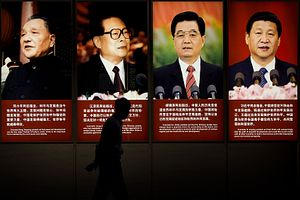This year marks the 40th anniversary of China’s Reform and Opening (gaige kaifang), initiated by Deng Xiaoping at the Third Plenum of the Eleventh Central Committee in 1978. These economic changes were so far-reaching that Deng described them as part of China’s “second revolution.” Since then, China has become an economic juggernaut with the world’s largest foreign reserves ($3.12 trillion), second-largest GDP ($11 trillion), and third-highest levels of foreign direct investment ($170 billion). Its share of the world economy grew from a mere 1.8 percent in 1978 to a staggering 18.2 percent in 2017. China is not just an emerging economy but has surely returned to its status as a major world economic power, which accounted for nearly 30 percent of the world economy in the 15th and 16th centuries.
Forty years after Deng’s momentous policy shift, the world is now witnessing another strong Chinese leader, Xi Jinping, who aspires to increase the country’s economic might. In Xi’s case, the goal is to convert the world’s second-largest economy into a global leader and manufacturing superpower. Not only has Xi put forth various domestic initiatives to usher in a new era of the “China Dream” (i.e., rejuvenating China through economic growth and modernization), he has also signaled a consistent commitment to continuing Deng’s legacy of economic reform and opening on the global stage (including at the G20 Summit in 2016, the Davos Forum in 2017, and the Boao Forum earlier this year).
While these developments have elicited both excitement and expectations regarding Beijing’s commitment to further liberalization, there are signs that China’s economic opening cannot be considered a foregone conclusion. The forces that account for the economic success of the Chinese model have also created tensions between a political system characterized by Leninist single party-led authoritarianism and an economy and society characterized by vibrant market forces. How much of China’s super-charged economic growth can be attributed to state-led planning and how much comes from entrepreneurship and market forces? With Xi holding all the levers of political power, how much is the Chinese leadership willing to let go of economic control?

































